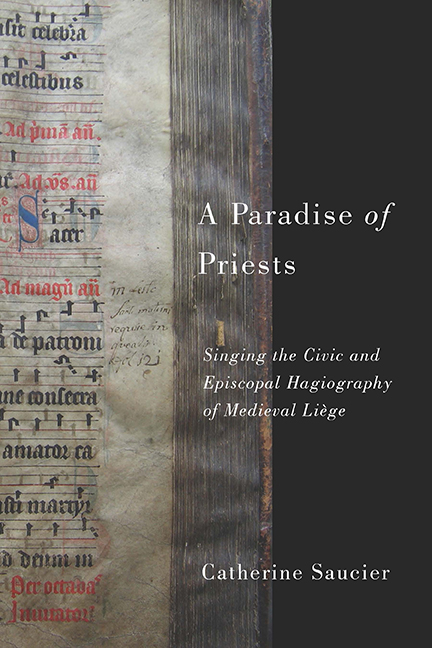Book contents
- Frontmatter
- Dedication
- Contents
- List of Illustrations
- Acknowledgments
- Abbreviations
- Note on Editorial Conventions
- Introduction: The Sound of Civic Sanctity in the Priestly Paradise of Liège
- 1 Martyred Bishops and Civic Origins: Promoting the Clerical City
- 2 The Intersecting Cults of Saints Theodard and Lambert: Validating Bishops as Martyrs
- 3 The Civic Cult of Saint Hubert: Venerating Bishops as Founders
- 4 Clerical Concord, Disharmony, and Polyphony: Commemorating Bishop Notger's City
- 5 Military Triumph, Civic Destruction, and the Changing Face of Saint Lambert's Relics: Invoking the Defensor Patriae
- Conclusion: Hearing Civic Sanctity
- Appendix: Service Books Preserving the Medieval Chant Repertory Sung in the City of Liège
- Notes
- Bibliography
- Index
1 - Martyred Bishops and Civic Origins: Promoting the Clerical City
Published online by Cambridge University Press: 15 March 2018
- Frontmatter
- Dedication
- Contents
- List of Illustrations
- Acknowledgments
- Abbreviations
- Note on Editorial Conventions
- Introduction: The Sound of Civic Sanctity in the Priestly Paradise of Liège
- 1 Martyred Bishops and Civic Origins: Promoting the Clerical City
- 2 The Intersecting Cults of Saints Theodard and Lambert: Validating Bishops as Martyrs
- 3 The Civic Cult of Saint Hubert: Venerating Bishops as Founders
- 4 Clerical Concord, Disharmony, and Polyphony: Commemorating Bishop Notger's City
- 5 Military Triumph, Civic Destruction, and the Changing Face of Saint Lambert's Relics: Invoking the Defensor Patriae
- Conclusion: Hearing Civic Sanctity
- Appendix: Service Books Preserving the Medieval Chant Repertory Sung in the City of Liège
- Notes
- Bibliography
- Index
Summary
In his Acts of the Bishops of Liège (published in 1612), local historian John of Chapeaville attributed the city's status and peaceful state to the spilled blood of its martyred bishop, Saint Lambert:
We will never give sufficient honor to the martyr, our patron, who in this place, in Liège, formerly a humble and unknown village, spilled his blood for truth and justice…. He attracted such blessing and such celebrity that this small settlement (vicus), better suited to shelter wild beasts than men, soon became a city (urbs) comparable to the most important [cities] of all the neighboring provinces. By his favor and his patronage, it is here that we live—at present more than we deserve to—in peace and tranquility, while everywhere else other cities face trouble. And above all we rest in faith and the catholic religion, which he implanted here while living and dying.
That Chapeaville identified Saint Lambert as the source of current civic stability testifies to the enduring connection between saintly and civic ideals. Indeed, the association of civic promotion with the act of martyrdom was, by Chapeaville's time, an ancient idea—one that originated in Early Christian thought and had circulated in local episcopal, hagiographic, and liturgical texts for centuries. Its emergence at a precise moment in liégeois history, however, was singularly essential for the nascent civic identity of this clerical hub.
Two interrelated concepts lie at the heart of Chapeaville's idyllic description of the city's founding and favorable condition: the martyr's patronage ensures civic protection and, more significantly, it stimulates civic growth. Like the major pilgrimage sites of Santiago de Compostela and Canterbury, it was the lure of the martyr's holiness and fame that transformed a humble village into a preeminent city. This idea is universal and circulated in earlier Christian literature through the varied genres of homily, encomium, and votive poetry. Long before Liège was founded, Bishop Avitus of Vienne (ca. 490–ca. 518) emphasized this dynamic and transformational aspect of saintly oversight in his dedication homily for the restoration of the baptistery in his episcopal city, observing, “Towns are glorified no less by their churches than by their spiritual patrons, or rather cities have been created out of towns by such patronage.” Acquiring the relics of the sanctified patron thus came to define the transition from town (oppidum) to city (urbs).
- Type
- Chapter
- Information
- A Paradise of PriestsSinging the Civic and Episcopal Hagiography of Medieval Liège, pp. 11 - 48Publisher: Boydell & BrewerPrint publication year: 2014



